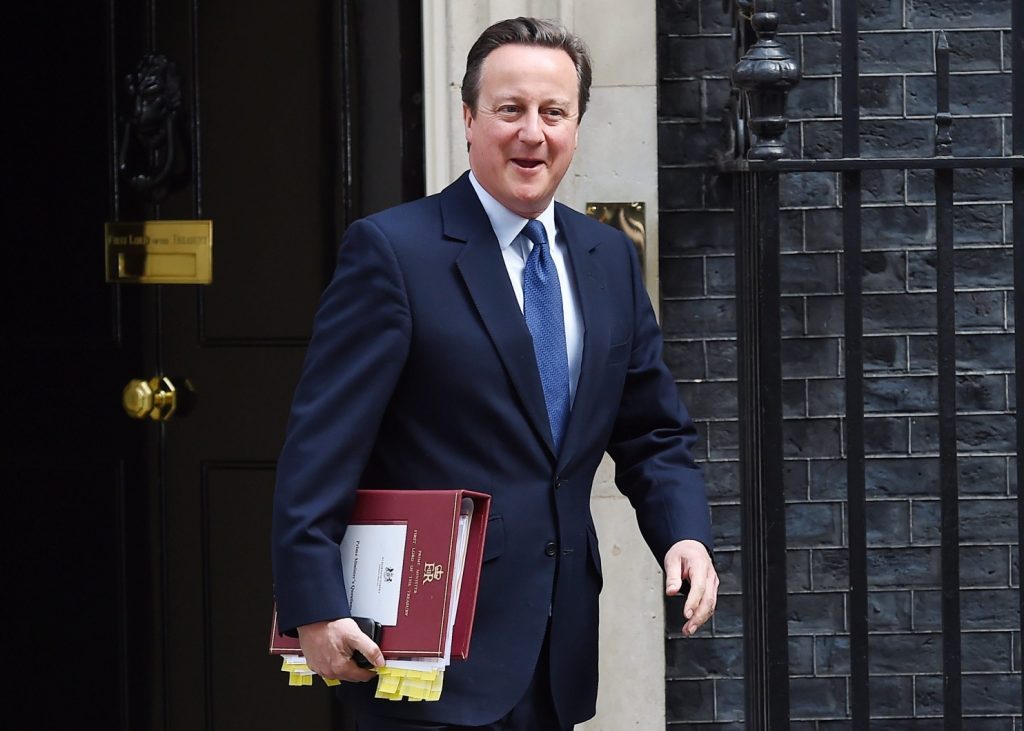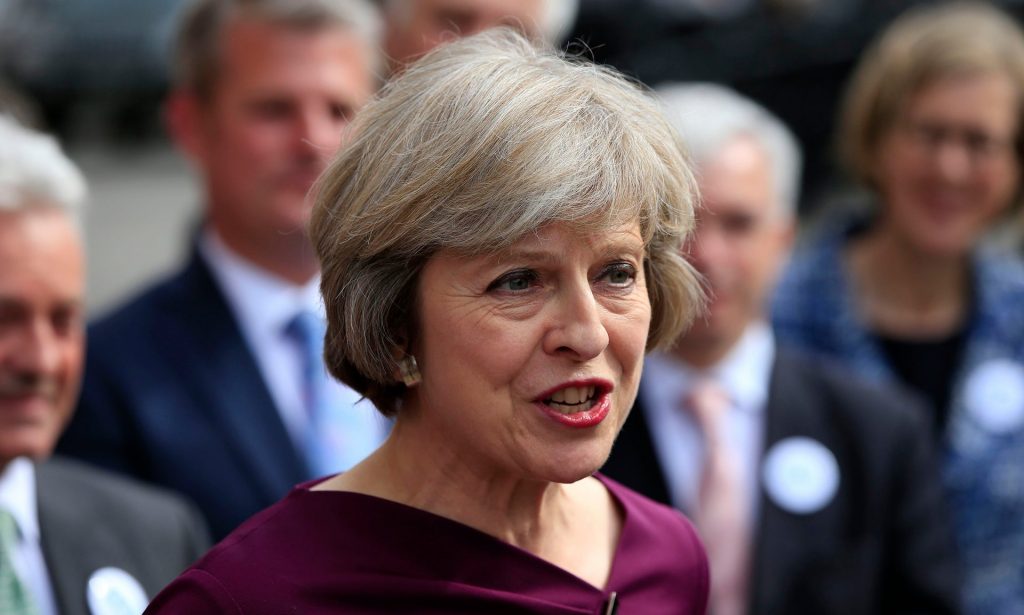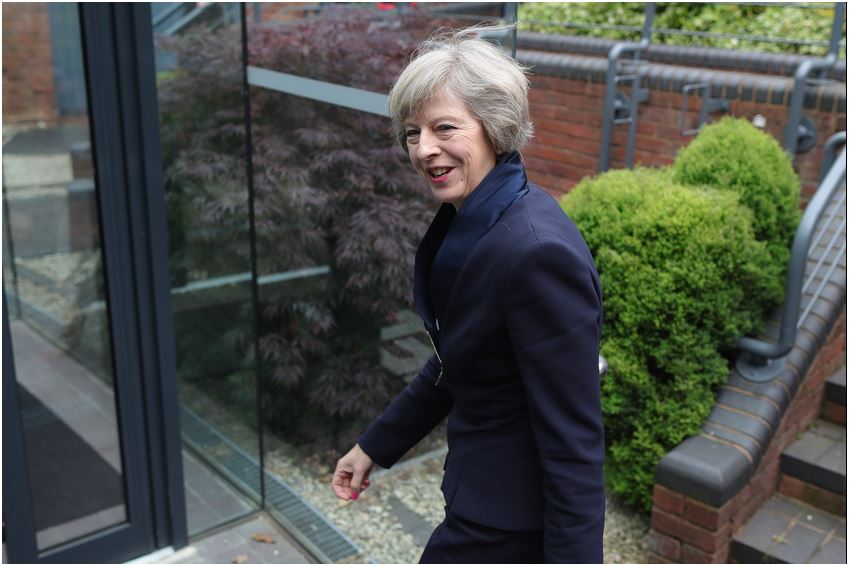
Britain’s political change of command opened Wednesday with David Cameron receiving a standing ovation at his valedictory appearance in Parliament as prime minister, and his successor Theresa May preparing for a summons from the queen.
The day was filled with all the pageantry that comes with a change of occupancy at 10 Downing Street. Cameron received a poignant send-off from the green benches of the House of Commons. Later in the afternoon, he was expected to make a ritual trip down The Mall to Buckingham Palace to resign, with May following soon after.
Cameron was welcomed to the House floor with a booming cheer, and his premiership was celebrated by fellow Conservatives who congratulated him on cutting the deficit, enacting gay marriage and appointing women to key posts — one of whom will take his place.
May will become the 13th prime minister to air-kiss the hand of the Queen, who at 90 has seen leaders of government come and go on average every five years during her six-decade-plus reign.
But amid the pomp and circumstance will be the serious business of a nation facing the most serious challenge to its identity since it shed its empire.
May, 59, inherits a daunting task from the 49-year-old Cameron, one that neither she nor he wanted: Taking the country out of the European Union.
She was expected to speak later on Wednesday about how she plans to forge ahead with that process, and will likely name a top lieutenant to serve as the point person for the tough negotiations to come with the European Union. May is also expected to pick other top figures in her cabinet, with women reportedly on tap for key roles.
May, who will be just the second female prime minister in British history after Margaret Thatcher, won the job on Monday after her sole rival in a campaign that was to last the summer, Andrea Leadsom, unexpectedly dropped out. May had already won the first round of voting – among Conservative members of Parliament – last week. With only one candidate in the race, a planned vote of rank-and-file party members was called off.
May takes the keys to 10 Downing Street after six years directing the country’s domestic security as home affairs secretary.
In that time, she developed a reputation as a steely yet cautious manager. Colleagues have described her as tough-minded and well-briefed on her portfolio of issues at home affairs, which included the fight against Islamist extremist violence and policing of the country’s borders.
She has been a hawk on the need to cut immigration, and had pushed for a greater government role in electronic surveillance.
Her views on foreign and economic policy are less well known. But in her first major speech on the economy this week, she sounded a more liberal than expected tone – emphasizing the need for growing the economy, rather than cutting government spending.
On foreign policy, she has taken a hard line on the need to contain Russia and China. She has also worked closely with colleagues across Europe and in Washington on counter-terrorism efforts as Westerners have flocked to Syria to fight alongside the Islamic State.
Supporters laud her resolve and her experience. Detractors depict her as stubborn and rigid.
“She’s the best of a bad bunch,” Vince Cable, a Liberal Democrat who worked alongside May as Business Secretary before last year’s general election, told the BBC on Wednesday.
As soon as May takes office, she will be briefed by top advisers on all the most pressing problems facing the country. She will also be asked to write, by hand, a “letter of last resort” — the orders given to the commander of Britain’s nuclear-armed Trident submarines to be exercised in the event that London is obliterated by attack and the prime minister is killed. She will have to decide whether her orders are to retaliate, surrender or something in between.
But of all the issues that will confront May beginning late on Wednesday, it is the British exit from the E.U. – Brexit — that looms largest.
During the country’s referendum campaign – which ended last month with a vote for Britain to leave the E.U. – she was a reluctant advocate for staying in the 28-member bloc.
But since the vote, she has repeatedly insisted that the voters’ will should be honored and that “Brexit means Brexit.”
One of her first major decisions as prime minister will be to choose when to begin negotiations. Before her victory was assured on Monday, she had said that she would not trigger Article 50 – the never-before-used mechanism for exiting the E.U. – before year’s end. But she is likely to come under pressure from European leaders across the English Channel and from Brexit advocates at home to accelerate that timetable.
Once the process has begun, Britain will have just two years to negotiate its way out of the E.U. The timetable is considered short for an untangling so complicated, with Foreign Secretary Philip Hammond telling Parliament this week that, in reality, it may take as long as six years.
Britain is hardly considered ready for the talks. Cameron announced his plans to resign last month on the morning after the vote, having failed to persuade the country to take his advice and stick with the E.U. despite its flaws. His government had no real plans for what to do the day after a Brexit vote.
A key May lieutenant, Chris Grayling, told the BBC on Wednesday that “we should not rush into triggering Article 50” and that “preparatory work” was still needed before the talks with Europe could begin.
For Cameron, Wednesday represents the disappointingly abrupt end to a premiership that has stretched six years – but was supposed to last as many as 10.
He won office having promised to modernize the Conservative Party and to rescue a then-struggling economy.
His backers say he succeeded on both counts: He pushed through the legalization of gay marriage, a measure that proved the Conservatives could embrace socially liberal positions. And amid steep cuts to government spending, he oversaw a slow but steady expansion of the economy after taking over a country still mired in the aftershocks of global recession.
But Cameron lost his biggest gamble: He had hoped to end a decades-long rift in the country, and especially his party, between opponents and critics of the E.U. with a national endorsement of the nation’s membership.
Last month’s narrow loss – 52 percent to 48 – means he will likely be remembered instead as the prime minister who unintentionally led the country to a sudden rift with Europe. That rift could also sever the bonds of the United Kingdom, with Scotland threatening to secede if Britain leaves the E.U.
Despite that, Cameron received a generally warm farewell in the House of Commons. Customarily a gladiatorial-style grudge match, the weekly Prime Minister’s Questions becomes a nostalgia-tinged farewell when a leader appears for the final time.
Standing two-swords lengths from opposition leader Jeremy Corbyn, Cameron said he had taken 5,500 questions during his six years, though in his typically jocular style, he added that he would “leave it to others to work out how many I’ve answered.”
Corbyn challenged Cameron on the rise in homelessness during his tenure, but also said he wished the prime minister well, and paid tribute to the “sacrifices” of Cameron’s wife Samantha and their children — all of whom were watching from the gallery.
The two party leaders also engaged in some final jousting. Cameron described Corbyn, who has stubbornly refused to step down despite losing widespread support, as “the Black Knight in Monty Python,” who loses limb after limb while insisting “it’s only a flesh wound.”
Corbyn replied in kind: After a Conservative leadership race that even Cameron described as “a coronation,” the Labour leader retorted that “democracy is an exciting and splendid thing and I’m enjoying every minute of it.”
Cameron concluded on a tender note, saying he would “miss the roar of the crowd” and would be “willing you all on.”
His final line referenced a barb he once directed at one of his predecessors, Tony Blair: “I was the future once,” the still-youthful-looking leader said.
As Cameron sat down, the entire Conservative bench, and even some from the opposition benches, did something that almost never happens in the rigorously tradition-based House of Commons: They stood and applauded.


